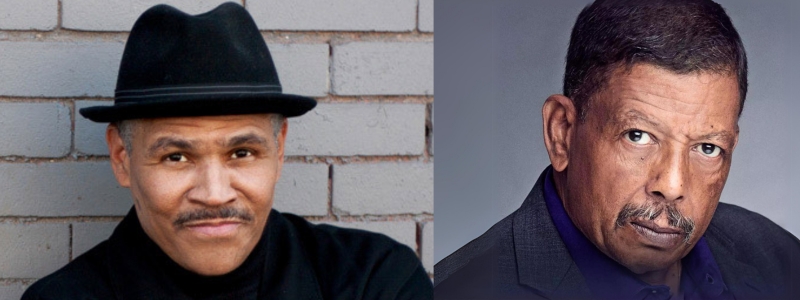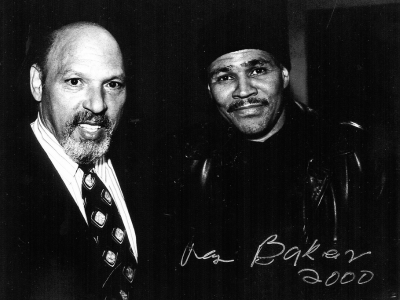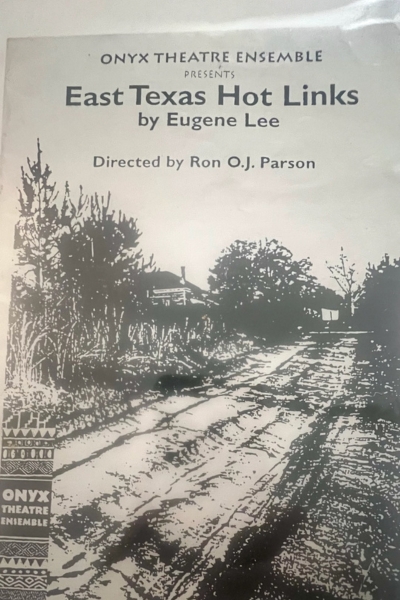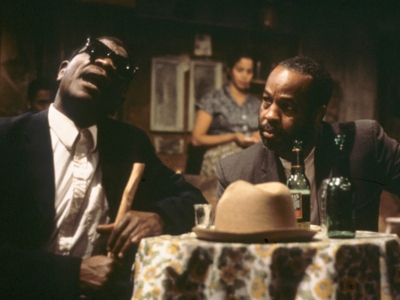In Conversation: Playwright Eugene Lee and Director Ron OJ Parson

To prepare for this production, Resident Artist and Director Ron OJ Parson caught up with his good friend Eugene Lee, playwright of East Texas Hot Links. What followed was a conversation rich with history, creative insights, cultural references, and truth.
East Texas Hot Links was the inaugural production of Onyx Theatre Company, co-founded by Ron OJ Parson and Alfred H. Wilson in 1994, and Onyx was the first theatre to stage this play in Chicago. By returning to Top O’ the Hill Café decades later, Parson asserts East Texas’s place in the modern theatrical canon and honors the legacy of Onyx.
Read on to get a unique glimpse into the artistic process and hear from the people most deeply connected to East Texas Hot Links – it doesn’t get closer than this.
What was the process of writing East Texas Hot Links?
Eugene: When I wrote this play, I sat down to write an episode of The Twilight Zone. I have a lot of respect for Rod Serling. What he could do in half an hour – in one room, with compelling storytelling, and really compelling characters who aren’t the same at the end – was amazing.

Ron: I can feel that, I can hear that. Doing your work, and August [Wilson], of course – you can feel the rhythm. You can hear the music.
Eugene: I’ve done all but a couple of August’s plays as an actor, and I basically sing them. They’re so poetic – everything you need is in the words. When you try to go against it, it’s like going against iambic pentameter in Shakespeare. You can defy it, but it ain’t gonna make much damn sense!
When I started writing, I was at dinner with my wife. I just said, “I’m going to write a play tonight.” I needed a title, she was reading the paper, and the first word she saw was “restaurant.” I started messing with that word, which led me to food, which led me to the food chain, which led to the play. The play is about how we feed off each other. That was the original inspiration.
White people always have this thing about not wanting to see “Black plays” because they feel like they’re going to be the villain, and in this play, there are no white people in it. And that’s on purpose. Because this is about us, for us, by us. The more I wrote, the more I realized that I was bridging a cultural gap. When white people came to see it, they wept – they wept in response to the truth that was coming out in a way they hadn’t expected. People don’t change until they get new information, and this play took on a whole different purpose.
Ron: The second time Onyx did the play, in 1998, just before James Byrd Jr. was murdered, a guy came to the play and talked about how unrealistic the play was. And then the James Byrd incident happened that week. He actually came back to the play and said, “Yes, I see now. It’s still happening.”
Eugene: We’re talking about lies and the truth. This play resonates a whole lot, even still today, because the truth has lost its place in life. The truth is the most humane and honorable route for anybody. East Texas is still East Texas, but it’s where I learned the truth. It’s a place that I love; it’s the place I grew up, it’s the place that shaped me. I think of East Texas as where I learned to bloom, so to speak.

How has your relationship to the play changed over time?
Eugene: I haven’t touched it – it’s like the Mona Lisa. There comes a point where you hang it on the wall and leave it to the Ron OJ Parsons of the world. Let it do what it does.
Ron: Some plays have something that gets in your soul, and this has always been one of those for me. I really appreciate that – you don’t really find a lot of those. This is one.
Eugene: I’ve had people who, years after they’ve seen the play, wake up and say, “Man, I’ve been thinking about that play!”
Ron: Thirty years ago we did this play with Onyx, and people will still come up to me and say, “When are you going to do East Texas? When are you going to do it on the South Side?” Things happen when they happen; things don’t just happen, things happen just. They come around when they’re supposed to come around.
What is important to understand about East Texas Hot Links?
Eugene: There’s love in this story. People make a sacrifice for a young boy, and that’s the ultimate love. I always thought, ten years later, that that boy would be at the front of the civil rights movement because of what happened to him that night.
Ron: What I like is the way you infuse the humor in it, though, in the midst of chaos.

Eugene: You’ve got to do that, as a storyteller! You can’t keep the pressure up for so long before people turn away. I can’t deny August [Wilson]’s influence on everything I put on the page. He read this! He read my play! I’ll never forget him sitting there: he said, “It’s important that you let them talk. Get out of the way and let them park and bark” – as they say in musical theatre. It’s Shakespearean, it’s classical, in every sense. I often see characters in my plays the way I see royalty in Shakespeare’s plays. You have to attack the language with the same ferocity. Every line of the play is meant to make something happen.
Ron: One of my favorite lines is when Charlesetta says, “You’ve got to do to change things”; which is a funny line, but it’s said when things are getting serious. The humor is so important. It’s like getting on a train, and the train is riding that track, and it’s picking up speed, and it’s going to crash, and you know it’s going to get there, but the humor makes the ride more enjoyable because, once you’re on the train, it’s moving.
Eugene: It’s a serious part of the process, to plot that last twenty percent of the play when it starts to pick up rhythmically. There aren’t as many monologues, the dialogue is quicker, and that was the hardest part of the writing. The cast helped me build that in the process.
Ron: That’s how I approach doing the play: letting it flow. Getting the right actors. I’ve done it with several different casts and it’s always about finding new things to get the right spirit. I’ll direct shows, and they open, and a lot of the time, I don’t have much interest in going back and seeing them. But with East Texas, if I’m in the town, I like to come back and see it. It makes me feel like, This is theatre. This is what theatre’s supposed to be.
Eugene: I make art to change the world. And we’re guardians of the truth; the human condition.
Ron: Like when that guy came back and apologized after the James Byrd incident, which reminds me of a classic Twilight Zone episode that I love: “I Am the Night – Color Me Black.”
In the episode, it’s dark all around and we’re in a town where people are getting ready to hang a man who’s been falsely accused of killing a racist. It’s dark all around, they’re waiting for the sun to come up – it never does – and at the end, there’s a monologue about how it’s so dark because of all the hate in the world. And, of course, Rod Serling comes in and names all these cities where it’s staying dark, where there’s still hate. There’s so much hate in the world but my friend, [playwright] Oyamo, used to say that we’re revolutionaries. Theatre is revolutionary. Change the world with theatre – that’s what we’re trying to do.
Pull up a chair at Top O’ the Hill Café and join us! East Texas Hot Links runs from Friday, September 6 – Sunday, September 29.
Tickets are on sale now and can be purchased online or by calling the Box Office at (773) 753-4472. Subscriptions including this production are also available – subscribe and save up to 44%! Learn more.